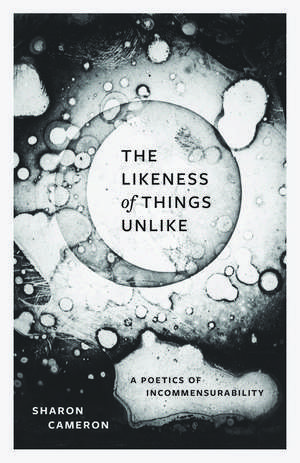The Likeness of Things Unlike: A Poetics of Incommensurability
Autor Sharon Cameronen Limba Engleză Paperback – 31 ian 2025
In Sharon Cameron’s essays, a magnetic constellation gathers works of Emerson, Whitman, Dickinson, Cather, and Stevens—each manifesting in its own terms “the likeness of things unlike”—to form a loose commonality in a strain of American writing in which incommensurable elements can’t be integrated and can’t be separated. The Likeness of Things Unlike is concerned with discordant elements of an aesthetic work and argues that these elements refigure the aesthetic wholes whose integrity they apparently violate. These intertwined, subversive elements are challenges to literary systems and are essentially philosophical in their rethinking of categories, and thus go beyond the aesthetic particulars that exemplify them.
Cameron is known for rigorously and brilliantly connecting artistic achievement to radical ways of thinking. Georg Lukcás describes the essayist as one who “adapts himself to the essay’s ‘smallness’ of form—the eternal smallness of the most profound work of the intellect in [the] face of life.” With The Likeness of Things Unlike Cameron powerfully demonstrates Lukács’s remarkable insight.
Preț: 170.58 lei
Nou
Puncte Express: 256
Preț estimativ în valută:
32.67€ • 33.66$ • 27.37£
32.67€ • 33.66$ • 27.37£
Carte nepublicată încă
Doresc să fiu notificat când acest titlu va fi disponibil:
Se trimite...
Preluare comenzi: 021 569.72.76
Specificații
ISBN-13: 9780226837055
ISBN-10: 022683705X
Pagini: 208
Dimensiuni: 140 x 216 mm
Greutate: 0.45 kg
Ediția:First Edition
Editura: University of Chicago Press
Colecția University of Chicago Press
ISBN-10: 022683705X
Pagini: 208
Dimensiuni: 140 x 216 mm
Greutate: 0.45 kg
Ediția:First Edition
Editura: University of Chicago Press
Colecția University of Chicago Press
Notă biografică
Sharon Cameron is the William R. Kenan Jr. Professor of English Emerita at Johns Hopkins University. Among her books are Lyric Time: Dickinson and the Limits of Genre, Thinking in Henry James, Impersonality: Seven Essays, and The Bond of the Furthest Apart: Essays on Tolstoy, Dostoevsky, Bresson, and Kafka.
Cuprins
Introduction
Beginning to Be: Emerson’s Paratactic Images
Whitman’s Translations
Done with the Compass, Done with the Chart: Off-the-Map Scenes in Dickinson’s Poems
Something like Nebraska and Something like Virginia: Cather’s Incommensurables
Wallace Stevens’s Entangled Objects
Acknowledgments
Notes
Index
Beginning to Be: Emerson’s Paratactic Images
Whitman’s Translations
Done with the Compass, Done with the Chart: Off-the-Map Scenes in Dickinson’s Poems
Something like Nebraska and Something like Virginia: Cather’s Incommensurables
Wallace Stevens’s Entangled Objects
Acknowledgments
Notes
Index
Recenzii
“For nearly half a century, Cameron has been the gold standard of literary critical brilliance in the field of American literature. In The Likeness of Things Unlike, she continues her inquiry into the intricate ways in which literary language dwells in a region populated by the incommensurable, the unaccommodated, what cannot ‘be identified as this or that’ because they ‘emerge in excess of either,’ challenging paradigms and categories. There could be no better guide than the incomparable Cameron to chart this excitingly volatile linguistic territory. The Likeness of Things Unlike is a dazzling work of exhilarating intellectual vigor.”
“Cameron develops an intricate, scintillating argument about the commensurability of the incommensurate, taking us far beyond the traditional bounds of aesthetics—into philosophy, indeed quantum physics—and making us see American literature as if for the first time. A meditation on sameness and difference that takes our breath away.”
"In one of her poems, Emily Dickinson tells us that when a certain slant of light goes, it’s like the distance on the look of death. Conveying the necessary, difficult relation between the sensation and the abstraction is Dickinson’s work in that poem; exploring how Dickinson and four other writers articulate the paradoxically shared difference of entities that can’t fit together but can’t be disjoined is Cameron’s work in this book. With a rare intensity, The Likeness of Things Unlike asks its readers to stretch their conceptual capacities, to think in unaccustomed ways, and it rewards with a fresh sense of what Dickinson, Ralph Waldo Emerson, Walt Whitman, Willa Cather, and Wallace Stevens impossibly achieve. There’s nothing else quite like it."
